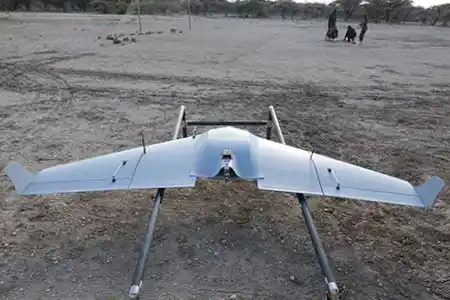Kenya’s military has mastered the use of drones to direct artillery strikes against targets before aerial engagement by armed helicopters.
The US government has helped strengthened Kenya’s hand in the fight against Somalia-based Al-Shabaab terrorists with the delivery of an unknown number of high-tech spy aircraft.
Kenya ordered five ScanEagle UAV systems under a $9.8 million FMS announced in September 2015. And in 2012, ordered eight Aerovironment RQ-11 Raven from the United States.
The ScanEagle drones are used to detect and monitor the Al-Shabaab movement and support the Kenyan and Somali force’s military operations.
“ScanEagle was ordered by the Kenyan government at a cost of $9.86 million (KSh1 billion),” said SIPRI military expenditure programme director Samuel Perlo-Freeman.
The drone is manufactured by Isintu a subsidiary of Boeing and has been used by the US military in Iraq and Afghanistan.
The unmanned aerial vehicles (UAV), enable Kenya to conduct real-time surveillance in the battlefield at home and abroad.
A spokesman for the State Department told the Business Daily last Thursday that the aircraft have been delivered and now form part of Kenya’s artillery.
“We can confirm that Kenya has received these ScanEagle units,” said David McKeeby, the US State Department spokesperson, in an email response to queries on the arms deal.
Mr McKeeby, however, did not disclose how many drones were delivered, insisting only the Kenyan government can disclose the information.
Kenyan does not make public its military purchases, and only Parliament is mandated to scrutinise classified expenditure of the security organs.
The US Department of Defence website, however, indicates that Kenya procured one ScanEagle aircraft system, consisting of undisclosed number of drones that come with launch and recovery equipment.
Stockholm International Peace Research Institute (Sipri), an arms trade monitoring agency, said a ScanEagle unit comprises four drones and ground systems, offering a glimpse into the number of the spy aircraft Kenya may have received.
The delivery comes even as Al-Shabaab militants last Friday attacked a Kenya Defence Forces (KDF) camp in Somalia using a Suicide Vehicle Borne Improvised Explosive Device (SVBIED).
It was not immediately possible to know if there were any casualties or the extent of the damage caused.
The KDF is serving in the African Union Mission in Somalia (Amisom) that has been fighting the insurgents since 2009.
The spy aircraft are expected to boost the Kenyan military’s surveillance and reconnaissance capabilities, as they can be deployed to gather information about terrorists in their hideouts for pre-emptive attacks.
The drone purchase came on the back of a string of bomb and gun attacks staged by the Islamist militants who are demanding the removal of Kenyan troops from the war-torn Horn of Africa nation.
Security experts say the drones have an edge in executing precision-guided attacks on militants, tracking their communication and foiling the training of recruits.
“The real time nature of data collection would allow for quicker reaction by trained and properly organised security forces besides foiling planned attacks,” said a Nairobi-based security expert, Andrew Franklin.
The ScanEagles use infrared cameras to capture still and moving images that are then relayed to control centres for action.
The acquisition places Kenya in the league of nations that have turned to spy aircraft to combat organised crime, including the United States, Britain, Australia, Italy and Japan.
Kenya and Cameroon are the only African nations with the ScanEagle, which is manufactured by Insitu, a subsidiary of giant US aircraft maker Boeing.
Mr Franklin said that increased focus on drone use had ushered in a new dawn of smart fighting against the terrorists.
In 2012, the US Pentagon announced plans to deliver small drones, dubbed Raven, to Kenya as part of its support to the war against Al-Shabaab.
Kenya was to receive eight hand-launched Raven drones with sensors that are capable of pinpointing targets
Nairobi in 2014 struck a deal with US-based College of Computing, Mathematical and Natural Sciences at the University of Maryland whose officials were expected to offer Kenyan military technical expertise in drone technology.
Kenya is partnering with Turkey (TAI) to develop and field a new surveillance drone. The terms of the agreement according to local sources a complete handover of the technologies required to build the drone. However, as of today, there are few details regarding the endeavour.
In early 2020 declassified documents issued in 2018 revealed the US had planned 12 construction projects in Djibouti, Kenya and Niger.
The US has asked the Kenyan government for permission to relocate armed drones there in support of operations against Al Shabaab in Kenya and Somalia, but it remains unclear if the Kenyan government is giving permission to do so.
AFRICOM also began pushing for authorisation to carry out drone strikes in eastern Kenya against al-Shabaab in 2020, without consulting Congress.
This would mean that AFRICOM could be allowed to carry out drone strikes under certain circumstances. The draft guidelines on conducting drone strikes in Kenya authorise drone strikes in self-defence and drone strikes that anticipate a suspected threat. Furthermore, the Kenyan government would have to give its consent for every drone attack.
Recently, the Kenyan armed forces are the newest user of the popular Turkish Bayraktar TB2 drone.
List of Kenyan military drones (UAV)
- AeroVironment RQ-11 Raven
- Kenya-Turkish (TAI) ANKA-A MALE UAV
- Insitu ScanEagle
- Class II VTOL drone
- Unmanned Aeronautics GhostRay
- Bayraktar TB2





